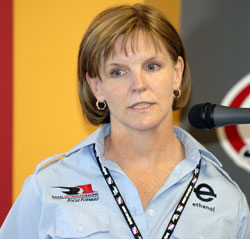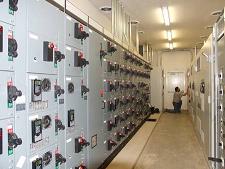 As you might remember from my post this past Tuesday (June 17th), biodiesel received preliminary approval from a subcommittee of ASTM International… an organization that sets standards for a variety of things, including fuels.
As you might remember from my post this past Tuesday (June 17th), biodiesel received preliminary approval from a subcommittee of ASTM International… an organization that sets standards for a variety of things, including fuels.
Now, biodiesel has cleared the next important hurdle as the full ASTM International D02 Main Committee voted to approve three long-awaited specifications for biodiesel blends. This National Biodiesel Board press release has more:
After more than five years of extensive research and subsequent balloting by the ASTM fuel experts in the blended fuel balloting process, ASTM has finally voted to approve three key sets of biodiesel specifications that should significantly bolster automaker support and consumer demand for biodiesel:
* Changes to the existing B100 biodiesel blend stock specification (ASTM D6751)
* Finished specifications to include up to 5% biodiesel (B5) in the conventional petrodiesel specification (ASTM D975)
* A new specification for blends of between 6 percent biodiesel (B6) to 20 percent biodiesel (B20) for on and off road diesel.
Automakers and engine manufacturers have been requesting a finished blend specification for B20 biodiesel blends for several years, with some citing the need for that spec as the single greatest hurdle preventing their full-scale acceptance of B20 use in their diesel vehicles.
Steve Howell, Chairman of the ASTM Biodiesel Task Force, said, “The new ASTM specifications for B6-B20 blends will aid engine manufacturers in their engine design and testing processes to optimize the performance of vehicles running on biodiesel. The new specifications will also help ensure that only the highest quality biodiesel blends are made available to consumers at the retail pump.”
The standards are expected to garner wider acceptance of the green fuel, especially among automakers and fleet managers.
 The Ethanol Car wound up practice in the top 10 with a combined (2 sessions) lap speed of 183.114.
The Ethanol Car wound up practice in the top 10 with a combined (2 sessions) lap speed of 183.114.

 After today’s ethanol press conference the media were treated to rides out on the track in the Iowa Speedway Pace Car.
After today’s ethanol press conference the media were treated to rides out on the track in the Iowa Speedway Pace Car. 
 Just a few minutes ago I got interviewed by one of the journalists here and he asked what I had heard from corn growers who are at the track. I told him they’re very proud to be growing the fuel that’s being used in the IndyCars out here and that they’ll recover from the flooding problems they’ve been having.
Just a few minutes ago I got interviewed by one of the journalists here and he asked what I had heard from corn growers who are at the track. I told him they’re very proud to be growing the fuel that’s being used in the IndyCars out here and that they’ll recover from the flooding problems they’ve been having.  One of the speakers at the ethanol industry press conference here at Iowa Speedway this morning was Mike Sobestski, Vice President/COO,
One of the speakers at the ethanol industry press conference here at Iowa Speedway this morning was Mike Sobestski, Vice President/COO,  This morning at Iowa Speedway, representatives of the ethanol industry held an “inside look at ethanol” press conference. One of the speakers was Toni Nuernberg, Executive Director of the
This morning at Iowa Speedway, representatives of the ethanol industry held an “inside look at ethanol” press conference. One of the speakers was Toni Nuernberg, Executive Director of the  We had a sunny day yesterday at Iowa Speedway until mid-afternoon when a thunderstorm popped up and absolutely drenched the track. It cut short practice plans although there’s going to be plenty of that today if the weather cooperates.
We had a sunny day yesterday at Iowa Speedway until mid-afternoon when a thunderstorm popped up and absolutely drenched the track. It cut short practice plans although there’s going to be plenty of that today if the weather cooperates.
 regulatory groups, Aquila and Kansas City Power & Light to provide economic opportunity to local farmers while reducing our dependence on fossil fuels.”
regulatory groups, Aquila and Kansas City Power & Light to provide economic opportunity to local farmers while reducing our dependence on fossil fuels.” As you might remember from
As you might remember from 